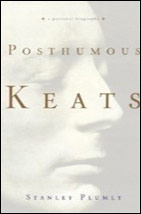 I was once at a dinner party where the conversation turned to the subject of death. Had any of us ever been affected by someone's untimely death? "Yes," said a woman; "Keats's." That more or less closed the conversation, but it shows how our thoughts about Keats are still, nearly 200 years on, inseparable from thoughts about his death.
I was once at a dinner party where the conversation turned to the subject of death. Had any of us ever been affected by someone's untimely death? "Yes," said a woman; "Keats's." That more or less closed the conversation, but it shows how our thoughts about Keats are still, nearly 200 years on, inseparable from thoughts about his death.
This is a book that engages very thoroughly with thoughts about Keats's death: his own, his friends', and those who were to manage his legacy. But, as Plumly concludes, "Brown and Severn will have to pass from the scene before any perspective on Keats becomes accurate and real. All of the Keats Circle, in fact, will have to die before his work in context with his death is fully discovered and addressed."
Certainly, there's something about the last three years of Keats's life which fascinates (see Jane Campion's Bright Star), yet Plumly does not descend into unnecessary morbidity. (A degree of it is necessary. Consider the death-mask, the blood coughed up, Keats's own ¬recognition of the significance of its colour . . .) And even though he goes over ground that may be familiar to the committed Keatsian, he has a point of view, and a tone of voice, which is itself uniquely poetic; dreamy, almost.
But even if at times it seems as though Plumly is writing a series of extended, meandering meditations without a clear goal in view, he always has something interesting to say either about Keats or about poetry, about the almost moral obligations it places upon its practitioners, and upon us. He quotes Keats writing about Burns, and his misspent life – "We can see horribly clear in the works of such a man his whole life, as if we were God's spies." Contemplation of Burns's life had prevented Keats from writing an intended "merry Sonnet". Here is Plumly's gloss: ". . . being a spy capable of reading the hidden life between the lines of anyone's work is itself a mixed blessing, because invariably the work reads you." That, I think, is a very fine way of putting it. Plumly always has a very fine way of putting it, though; the prose style throughout is exquisite, and evidence of large-heartedness, -imagination and acuity.
He notices, in Keats's unmerry sonnet on Burns, the one beginning "This mortal body of a thousand days", the fact that Keats had managed somehow to allude to his own death – he had, himself, 50 days short of 1,000 left on earth. "How could it be so close to the actual time line?" asks Plumly, who then speculates: "John Keats living into his 40s, imagine that. Of course, then you would have to imagine Keats employed or making a living from his writing, his fame. You would have to imagine Keats owning property, voting Whig, or emigrating to America to become the first great American poet, famous or otherwise." (Plumly is an American poet and his wistful yearning to appropriate Keats for his own nationality is, I think, incredibly touching. Incidentally, Andrew Motion, who also wrote a fine biography of the poet, did a very good job of imagining an ¬alternative life for Keats in his The -Invention of Dr Cake.)
Keats's life seems to be so full of might-have-beens, and Plumly is very good at teasing us with them, while at the same time keeping us alive to the facts: how Coleridge, after their one meeting on Hampstead Heath, "defines exactly Keats's lifelong dilemma: not being born a lord and six feet tall while at the same time born a genius"; or what might have happened to his -medical career if he had been apprenticed to Astley Cooper, the deftest surgeon of his day, rather than to his colleague Billy Lucas, "known publicly as 'the Butcher'". (That "publicly" is horribly telling.)
This is, then, a remarkable book. You need not take my word for it. Christopher Ricks, who knows his onions about Keats, has raved about it; and Jack Stillinger, editor of Keats's Complete Poems, said "It's certainly the best book ever written about Keats (and I've read all the others) and may well be the best book anybody has written on any writer." Endorsement enough, I think.
Posthumous Keats: A Personal Biography
by Stanley Plumly
288pp,
WW Norton
The Guardian
20.02.2010